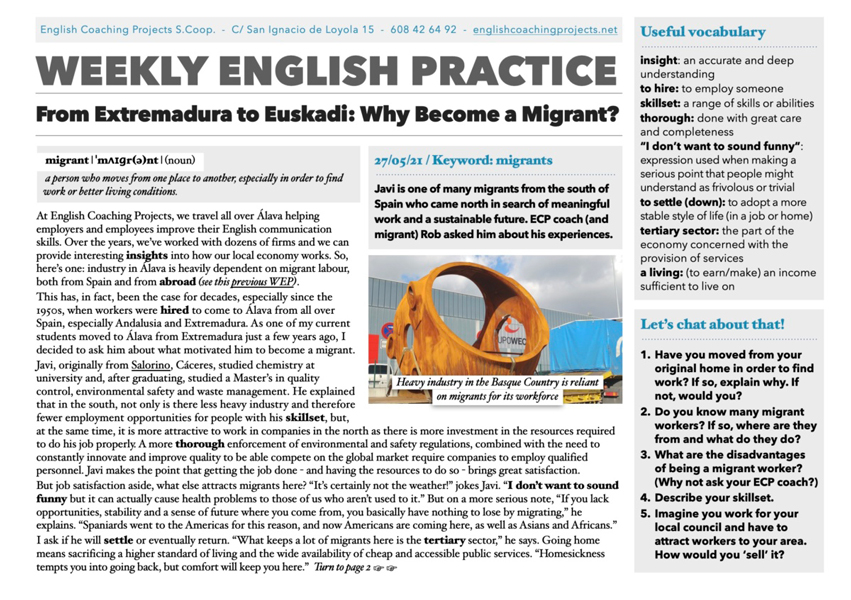From Extremadura to Euskadi: Why Become a Migrant?
27/05/21 / Keyword: migrant
Javi is one of many migrants from the south of Spain who came north in search of meaningful work and a sustainable future. ECP coach (and migrant) Rob asked him about his experiences.
Click HERE to download the Weekly English Practice as a PDF.
Useful vocabulary
insight: an accurate and deep understanding
to hire: to employ someone
skillset: a range of skills or abilities
thorough: done with great care and completeness
“I don’t want to sound funny”: expression used when making a serious point that people might understand as frivolous or trivial
to settle (down): to adopt a more stable style of life (in a job or home)
tertiary sector: the part of the economy concerned with the provision of services
a living: (to earn/make) an income sufficient to live on
Listen to the audio and read the text (refresh the page if it’s not visible).
Javi is one of many migrants from the south of Spain who came north in search of meaningful work and a sustainable future. ECP coach (and migrant) Rob asked him about his experiences.
migrant | ˈmʌɪɡr(ə)nt | (noun)
a person who moves from one place to another, especially in order to find work or better living conditions.
At English Coaching Projects, we travel all over Álava helping employers and employees improve their English communication skills. Over the years, we’ve worked with dozens of firms and we can provide interesting insights into how our local economy works. So, here’s one: industry in Álava is heavily dependent on migrant labour, both from Spain and from abroad (see this previous WEP).
This has, in fact, been the case for decades, especially since the 1950s, when workers were hired to come to Álava from all over Spain, especially Andalusia and Extremadura. As one of my current students moved to Álava from Extremadura just a few years ago, I decided to ask him about what motivated him to become a migrant.
Javi, originally from Salorino, Cáceres, studied chemistry at university and, after graduating, studied a Master’s in quality control, environmental safety and waste management. He explained that in the south, not only is there less heavy industry and therefore fewer employment opportunities for people with his skillset, but, at the same time, it is more attractive to work in companies in the north as there is more investment in the resources required to do his job properly. A more thorough enforcement of environmental and safety regulations, combined with the need to constantly innovate and improve quality to be able compete on the global market require companies to employ qualified personnel. Javi makes the point that getting the job done – and having the resources to do so – brings great satisfaction.
But job satisfaction aside, what else attracts migrants here? “It’s certainly not the weather!” jokes Javi. “I don’t want to sound funny but it can actually cause health problems to those of us who aren’t used to it.” But on a more serious note, “If you lack opportunities, stability and a sense of future where you come from, you basically have nothing to lose by migrating,” he explains. “Spaniards went to the Americas for this reason, and now Americans are coming here, as well as Asians and Africans.”
I ask if he will settle or eventually return. “What keeps a lot of migrants here is the tertiary sector,” he says. Going home means sacrificing a higher standard of living and the wide availability of cheap and accessible public services. “Homesickness tempts you into going back, but comfort will keep you here.”
I enquire if his foreign colleagues feel the same. “Perhaps my workmates from Pakistan and Latin America think more about their families back home. Just like generations and generations of Spaniards have done while working all around the world, they send back economic support and maybe purchase property to which they plan to return to settle down and start a family,” he explains. “But it all depends on the relationships you build in your new home. Once you have children that grow up there, the whole concept of ‘home’ changes.”
What is clear, is that Álava’s migrant workers – your ECP coaches included – have come here to earn a decent living and build a sustainable future. Whether that future is here or ‘back home’ is another question, as Javi explained with a wink: “When I’m old, I’ll probably buy a flat in the lovely south to retire to. But I doubt I’ll want to live there all year round!”
I think I should ask Leo Messi – Spain’s most famous migrant worker – or Dusko Ivanovic – Baskonia’s much-loved head coach – what their plans are for the future. Now, where did I put their phone numbers?
Written by ECP coach Rob Hextall.
A big thank you to Javi for taking time to answer all my questions!
Let’s chat about migrant workers!
- Have you moved from your original home in order to find work? If so, explain why. If not, would you?
- Do you know many migrant workers? If so, where are they from and what do they do?
- What are the disadvantages of being a migrant worker? (Why not ask your ECP coach?)
- Describe your skillset.
- Imagine you work for your local council and have to attract workers to your area. How would you ‘sell’ it?
Take a moment to look at these related articles!
Double Standards When Talking About Immigrants
Leo Varadkar, Gay Son Of Indian Immigrant, To Be Next Irish PM

